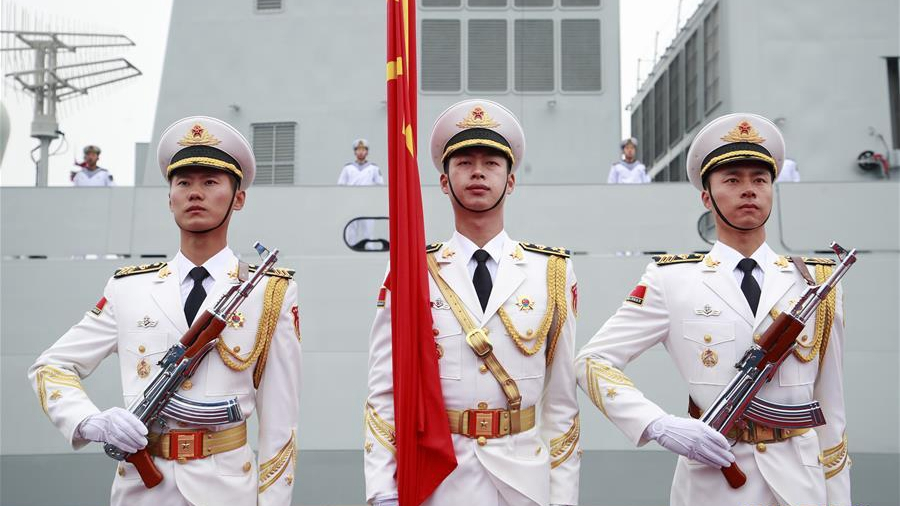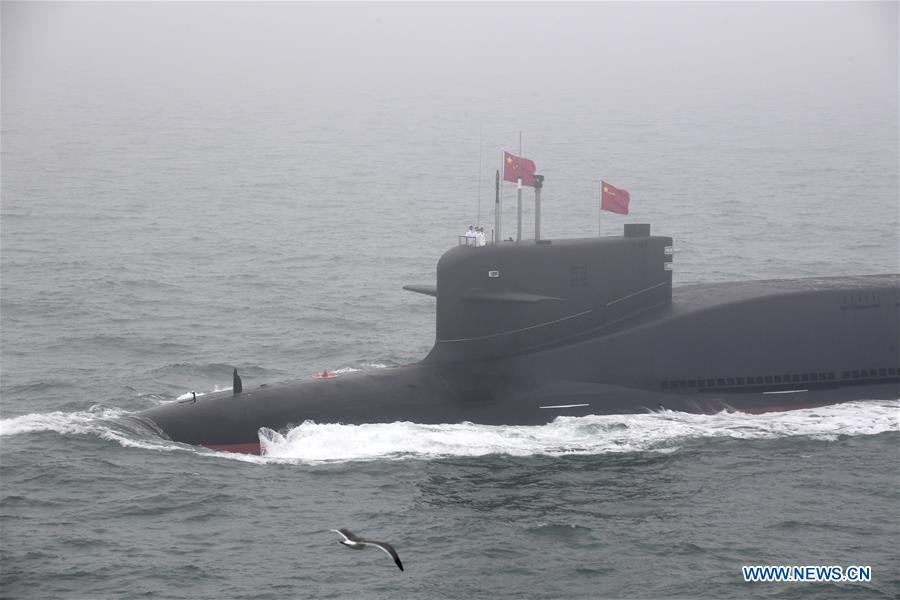
Opinion
22:40, 23-Apr-2019
China's naval parade and BRI have something in common
Adam Garrie

Editor's Note: Adam Garrie is the director of the UK-based global policy and analysis think tank Eurasia Future and co-host of a talk show "The History Boys." The article reflects the author's opinion and not necessarily views of CGTN.
The Chinese People's Liberation Army (PLA) Navy has kicked off large scale multinational naval drills off the coast of Qingdao to celebrate the 70th anniversary of the founding of the PLA Navy. The events have been one part celebration and one part display of cooperative endeavors between multiple naval forces from Asia and beyond.
Countries that are participating in the drills include Japan, Russia, India, Bangladesh, Republic of Korea, Myanmar, Malaysia, The Philippines, Brunei, Australia, Thailand and Vietnam. During the events, China publicly unveiled its first 10,000-ton class guided missile destroyer to much acclaim from international naval experts.
Although the purpose of the joint naval drills is to explore the prospect of improved joint security cooperation, it is heavily symbolic that the drills come days before the second Belt and Road Forum for international cooperation (BRF) in Beijing.
The Belt and Road Initiative (BRI) is strictly economic in nature and does not involve any military, security or political components. BRI is, however, a project designed to facilitate greater world peace by replacing a competitive global atmosphere with a cooperative one.

A new type of nuclear submarine of the Chinese People's Liberation Army (PLA) Navy is reviewed during a naval parade staged to mark the 70th founding anniversary of the PLA Navy on the sea off Qingdao, east China's Shandong Province, April 23, 2019. /Xinhua Photo
A new type of nuclear submarine of the Chinese People's Liberation Army (PLA) Navy is reviewed during a naval parade staged to mark the 70th founding anniversary of the PLA Navy on the sea off Qingdao, east China's Shandong Province, April 23, 2019. /Xinhua Photo
As such, the world that can result from multilateral commitments to BRI could be one in which cross-border conflicts, regional rivalries and global suspicions would be replaced by nations throughout the world using the revenues derived from expanding trading and investment opportunities to further develop their own nations with the cooperation of win-win partners.
This naturally implies a world whose resources are aimed and enhancing the quality of life for all, rather than a global environment in which people are threatened by an atmosphere of militarism.
This more peaceful world that BRI aims to create will give people on all continents an opportunity to play a part in creating a better global environment that focuses on material and human development as a priority while security will shift from one aimed against other nations to one aimed at combating the three evils of terrorism, separatism and religious extremism.
Because of this, it is crucial that multiple nations, with histories of relations with China that are highly varied, all came to freely participate in the drills and celebrations at Qingdao. This demonstrates that the spirit of cooperation that defines China's relations with foreign powers is alive and well not only in the sphere of trade, development and sustainable finance, but also in the field of mutual security concerns.
Even nations like India and Japan have self-evidently come to the realization that the world will be a safer place when cooperation tears down the walls of suspicion and that a harmonious approach to security is vastly more important than one based on the gamesmanship of the past.

A banner of the second BRI forum is displayed on a street in Beijing, April 22, 2019. /VCG Photo
A banner of the second BRI forum is displayed on a street in Beijing, April 22, 2019. /VCG Photo
In this sense, it is also noteworthy that while countries like Russia and India share a position in the Shanghai Cooperation Organization with China, multiple countries from the neighboring ASEAN group of nations also attended.
This indicates a wider pan-Asian attitude that looks to collectively shape what is being called the Asian century on the principles of cooperation on matters of mutual concern that is combined with a spirit of fraternal non-interference into the internal affairs of partner nations.
Although the Qingdao drills are a separate event from the forthcoming BRF, both events serve to highlight how much more can be accomplished for the world as a whole when cooperation, mutual respect and positive exchange form the basis of relations between nations and peoples.
(If you want to contribute and have specific expertise, please contact us at opinions@cgtn.com.)

SITEMAP
Copyright © 2018 CGTN. Beijing ICP prepared NO.16065310-3
Copyright © 2018 CGTN. Beijing ICP prepared NO.16065310-3